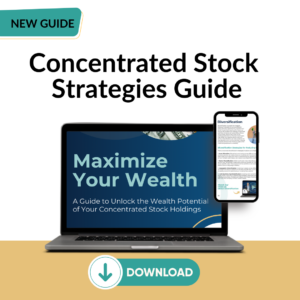
Having significant company stock can be a double-edged sword, financially beneficial and psychologically challenging. It’s natural to feel a sense of loyalty and pride in the company that granted you these shares, but this emotional attachment can sometimes blur your judgment and lead to less-than-optimal investment choices. Grasping the psychological elements of this attachment and acquiring strategies to handle it is vital for maintaining a robust, diversified portfolio and securing your financial future.
The Psychological Aspects of Holding Company Stock
Emotional attachment to company stock often stems from a deep connection to the company itself. Whether you’re an employee who has received stock options, an executive with a substantial stake, or an investor who believes strongly in the company’s mission, this attachment can influence your decisions in several ways:
- Overconfidence: Believing too strongly in the company’s prospects can lead to overestimating its potential and underestimating risks.
- Loss Aversion: The fear of losing value can make you reluctant to sell, even when diversification would be a wiser choice.
- Endowment Effect: Valuing the stock more simply because you own it leads to unbalanced financial decisions.
The Impact of Emotional Attachment on Investment Decisions 
It’s essential to be aware of the negative effects of emotional attachment on investment decisions. This attachment can lead to a lack of diversification, leaving your portfolio exposed to unnecessary risks. For example, if the company experiences downturns, regulatory issues, or market volatility, your concentrated holdings can significantly impact your financial stability. Moreover, the emotional rollercoaster tied to the company’s performance can lead to stress and anxiety, affecting your overall quality of life.
Strategies to Manage Emotional Attachment to Stocks
- Set Clear Investment Goals: Establish clear financial goals and a strategy that aligns with them. This helps maintain focus on the bigger picture rather than the performance of a single stock.
- Regular Portfolio Reviews: Review your portfolio regularly with a financial advisor to ensure it remains balanced and diversified. This practice helps you stay objective and make necessary adjustments.
- Limit Exposure: Gradually reduce your concentrated stock position by selling portions over time. This can be done in a tax-efficient manner to minimize liabilities.
- Diversify: Reinvest the proceeds from selling your company stock into a diversified portfolio of assets. Diversification spreads risk and can enhance long-term returns.
- Utilize Professional Advice: Work with a financial advisor who can provide an unbiased perspective and help you make rational decisions. Advisors can also help implement strategies like hedging to protect your remaining concentrated stock position.
- Stay Informed: Educate yourself about the broader market and your company’s industry. A well-informed investor is better equipped to make rational decisions rather than emotionally driven ones.
- Mindfulness and Emotional Discipline: Practice mindfulness and emotional discipline. Recognize when emotions are influencing your decisions and take a step back to reassess your choices objectively.
Speak to an Experienced Stock Planning Professional
Managing emotional attachment to company stock is essential for making rational investment decisions and securing your financial future. By understanding the psychological aspects of this attachment and implementing practical strategies, you can maintain a balanced portfolio that aligns with your long-term goals. Remember, diversification is not just a financial strategy—it’s a mindset that promotes stability and growth.
For personalized advice and support, consider consulting with a trusted financial advisor who can guide you through this process with expertise and care.
ALL INFORMATION HEREIN HAS BEEN PREPARED SOLELY FOR INFORMATIONAL PURPOSES. ADVISORY SERVICES ARE ONLY OFFERED TO CLIENTS OR PROSPECTIVE CLIENTS WHERE MISSION WEALTH AND ITS REPRESENTATIVES ARE PROPERLY LICENSED OR EXEMPT FROM LICENSURE. PAST PERFORMANCE IS NO GUARANTEE OF FUTURE RETURNS. INVESTING INVOLVES RISK AND POSSIBLE LOSS OF PRINCIPAL CAPITAL. NO ADVICE MAY BE RENDERED BY MISSION WEALTH UNLESS A CLIENT SERVICE AGREEMENT IS IN PLACE.
Customized Investment Management Solutions
At Mission Wealth, we develop customized, globally diversified, tax-efficient portfolios tailored to your financial plan and built to stand the test of time. Contact us below for a free portfolio review.Investment Advice Fit For Your Needs
At Mission Wealth, we are deeply rooted in an evidence-based investment strategy built on decades of Nobel Prize-winning research. We ignore the media noise and Wall Street hype, relying instead on a long-term approach and proven principles that reward investors over time. For more information on Mission Wealth's investment strategies, please visit missionwealth.com.
To meet with a Mission Wealth financial advisor, please contact us online today or call us at (805) 882-2360.
Mission Wealth is a Registered Investment Advisor. This commentary reflects the personal opinions, viewpoints, and analyses of the Mission Wealth employees providing such comments. It should not be regarded as a description of advisory services provided by Mission Wealth or performance returns of any Mission Wealth client. The views reflected in the commentary are subject to change at any time without notice. Nothing in this commentary constitutes investment advice, performance data, or any recommendation that any particular security, portfolio of securities, transaction, or investment strategy is suitable for any specific person. Any mention of a particular security and related performance data is not a recommendation to buy or sell that security. Mission Wealth manages its clients’ accounts using a variety of investment techniques and strategies, which are not necessarily discussed in the commentary. Investments in securities involve the risk of loss. Past performance is no guarantee of future results.
Let's Keep in Touch!
Subscribe for exclusive content and timely tips to empower you on your financial journey. Our communications go straight into your inbox, so you'll never miss out on expert advice that can positively impact your life.Recent Investment Insights Articles

Market Perspectives Q4 2025
November 19, 2025
Market Update 10/29/25: Fed Delivers Rate Cut as Economy Shows Resilience
October 29, 2025


